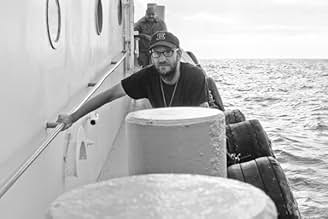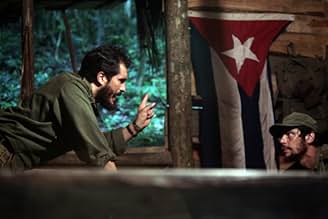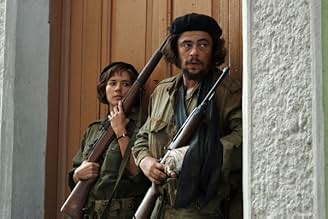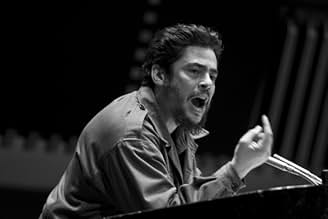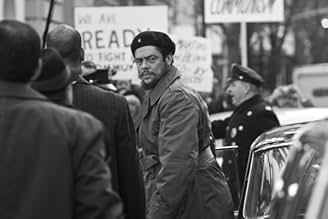En 1956, Ernesto 'Che' Guevara y un grupo de exiliados cubanos liderados por Castro movilizan un ejército para derrocar al régimen del dictador Fulgencio Batista.En 1956, Ernesto 'Che' Guevara y un grupo de exiliados cubanos liderados por Castro movilizan un ejército para derrocar al régimen del dictador Fulgencio Batista.En 1956, Ernesto 'Che' Guevara y un grupo de exiliados cubanos liderados por Castro movilizan un ejército para derrocar al régimen del dictador Fulgencio Batista.
- Premios
- 4 premios ganados y 13 nominaciones en total
- Interpreter
- (as Óscar Isaac)
- María Antonia
- (as María Isabel Díaz)
- Fidel Castro
- (as Demian Bichir)
- Héctor
- (as Ramón Fernández)
- Alejandro Ramírez
- (as Yul Vázquez)
- Jorge Sotús
- (as Jsu García)
- Rebel Messenger #1
- (as Luis Rodríguez Sánchez)
- Juan Almeida
- (as Roberto Luis Santana)
- Dirección
- Guionistas
- Todo el elenco y el equipo
- Producción, taquilla y más en IMDbPro
Argumento
¿Sabías que…?
- TriviaFor his role, Benicio Del Toro spent seven years researching Guevara's life.
- ErroresWhen the guerrilleros are in the Sierra Maestra, we can hear the coqui (Eleutherodactylus coqui) singing in the night. However, this small frog is endemic to Puerto Rico and the Virgin Islands, thus not possible to be heard in Cuba.
- Citas
Lisa Howard: What is the most important quality for a revolutionary to possess?
Ernesto Che Guevara: El amor.
Cuban Diplomat #1: [translating] Love.
Lisa Howard: Love?
Cuban Diplomat #1: Love of humanity... of justice and truth. A real revolutionary goes where he is needed.
- ConexionesFeatured in Así se hizo - Che El Argentino (2008)
- Bandas sonorasBasura
Written and Performed by Mark A. Mangini (as Mark Mangini)
I'll put this film together with Medem's 'La pelota vasca' (an assumed documentary) for they both show an extreme sensitivity working with such delicate themes as like they choose to work. Both originated some contesting, More with Medem's because the director was more rooted in the problem that was shown, and because the story is far from being closed, but to me they were both opened films which, as any contemporary film should be, leave a lot of the thinking to the public, and work as brain starter for discussion.
The narrative structure is effective, the artwork and editing are of great competence. Che in the woods of Sierra Maestra, on the verge taking the power in Cuba inter cut with his visit to the USA, in 1964. This second line is shot in black and white, the other has beautiful colors. The absence of music was a mildly risky choice i appreciated. The rest, you can think of it yourself. I thought Del Toro was very good, internally concentrated, resisted totally to being what we expected Che to be, and that's something, to be able to interpret a character with such an charismatic aura behind him, which we can still feel when his own words are spoken. From this film on, i admire Del Toro; before this i didn't look at him as i do now. I'll review his previews performances, i have to check if i didn't notice how good he is. Quite on the contrary, Bichir, as Fidel, was a total disaster, frankly one of the worst performances i've ever seen. How could he think Fidel was all about imitating a voice, some gestures, and handling a cigar. What a mess.
Of course this man's story is controversial, which means one can make radically opposed opinions out of the same known and accepted facts. The fair amount of arguments i've had since i saw it with someone who saw it with me prove me right here. I think Guevara was a lucid man, who read perfectly well the mechanics of the world of oppression where he stood. He chose to stand there and live like them, though he wasn't like them, and that's worth admiration. The ideas he made of the injustice he saw was a product of a genuine mind. But though the diagnosis was right, the whole process of making it in practical terms was a mess, to my eyes. He was at the root of a regime, inserted in a bigger regime, that grew on arrogance, on hypocrisies, and at a certain point became at least so unfair to the same oppressed people as those oppressed had before. And that's because, though wanting to do different, this revolution used the same weapons of strenght and physical superiority others had used. And that killed the whole idea. And Guevara was there, with it, being oppressive when he thought he was being better, out of, i think, ingenuity. What i say is, read the man, his observations are probably equally (or even more) correct today as they were when he made them, but don't follow his steps, i wouldn't, not knowing what i know today.
Also, notice how Che, the icon, grew to incredible proportions, 3 reasons i give it:
-He died young, and fighting for ideals, at least shooting for ideas;
-He was picked up by the very capitalism he rejected and was sold like an icon the population (mainly youth) desperate to get out of the contradictions in this regime, check the contradiction of this;
-He had an image standing for him, literally an image, the photograph Korda took. It's amazing, and it's probably an unique case, how a single image can move millions, how the right moment, with the right publicity can be so powerful. If you think about that, among the capitalists who sell tshirts and the liberals who believe Guevara, this is image is the center of the most successful publicity campaign ever. Once more, i admire Soderbergh's intelligence to leave that image out of this film. It's more than avoiding a cliché. It's avoiding the viewers to go recall clichés they've made (me included) over that image.
My opinion: 4/5
http://www.7eyes.wordpress.com
- RResende
- 24 oct 2008
- Enlace permanente
Selecciones populares
Detalles
Taquilla
- Presupuesto
- USD 35,000,000 (estimado)
- Total en EE. UU. y Canadá
- USD 748,555
- Fin de semana de estreno en EE. UU. y Canadá
- USD 61,070
- 14 dic 2008
- Total a nivel mundial
- USD 34,209,066
- Tiempo de ejecución2 horas 14 minutos
- Color
- Mezcla de sonido
- Relación de aspecto
- 2.39 : 1
Contribuir a esta página


